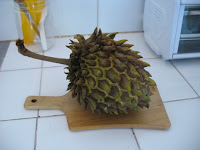Oil and Water

My friend Juan, who has a college degree and used to run a tourism project in the Kichwa community where he grew up, gave me two reasons that he is now working for Ivanhoe, a Canadian oil company contracted by the Ecuadorian government to drill in the most populous region of the province, where he and I both live: People in the cities benefit from tourism dollars, but not the communities. And heavy crude is breaking through the surface, so it’s a health hazard to leave it there.
There are counter arguments to Juan’s statements, but I can't deny his concerns about work. I also know, as does he, the atrocious record that some oil companies have in the northern Amazon. Chevron-Texaco’s unfettered oil drilling dumped 30 times more crude in the rivers than was spilled during the Exxon Valdez disaster, and cancer is rampant in that area.
Everyone here knows what happened in the north, and some trust that the government will implement sufficient controls to prevent widespread environmental destruction. Others see that the government has already broken its own laws, including allegations of “serious irregularities” in the Ivanhoe deal. And then there is the fact that Ivanhoe’s technology for converting heavy crude (all that exists here) into light crude has been tested only over the last few years and on a small scale in Bakersfield, CA. Living on a tributary of the Amazon River and in one of the most biologically diverse areas in the world, we are a long way from Bakersfield.
It was one thing to read about these conflicts from my former apartment in the San Francisco Bay Area. Now I can watch them unfold right outside my door. Ivanhoe thinks it will be able to extract more than 100,000 barrels a day about 2 miles from where I live in Tena.

The government finance directors think the oil revenue will pay for health and education programs. Some locals think Ivanhoe will shower them with jobs or money for infrastructure. Politicians think they’ll earn extra cash and votes. I think it could be a disaster, and not just environmentally. Coca and Lago Agrio, in the heart of the Chevron-Texaco mess, are notoriously dangerous, drug-plagued cities. Tena is so safe that I don’t even bother to lock my door sometimes.
But rather than give in to fear, I’m hoping that the delicious incompetence of the Ecuadorian government, combined with falling oil prices, will buy a little time. Meanwhile, some friends of mine and I have started Amazon Partnerships Foundation to help communities find practical ways to use and renew natural resources to meet their basic needs so that jobs promised by oil companies are not their only option.
We’ll provide grants and project management training to communities that want to design and implement their own projects to protect the environment or promote the conservation values of traditional Kichwa culture. One grant could supply a women’s group with training to market their hand-made jewelry and baskets, earning them income to buy food and school supplies for their kids. Another grant could help a community start a sustainable forestry project so they could reforest part of their land for conservation and have a reliable source of income through lumber sales.

For everyone, it's an experiment in coping during difficult times, and none of us has any guarantee of an outcome that will ensure happiness and well-being. But one thing this place teaches us foreigners is that small victories matter. And when I look out at the lush foothills and rivers and imagine what could disappear . . . whatever I might see ten years from now, I want to know that at least I didn't shy away from the battle.
Thanks to Sadie Funk for the river photo.
Labels: communities, environment, Kichwa, politics, river












